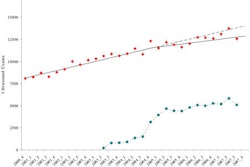One of healthcare's success stories is the steadily increasing number of children who are successfully treated for cancer, with survival rates currently estimated at 75% to 80%. But childhood cancer survivors and their physicians face challenges later in life due to a higher risk of chronic health conditions as a result of pediatric cancer treatment.
A new program called Passport for Care is addressing this issue by providing the physicians of childhood cancer survivors with access to their cancer-related medical records, as well as giving them individualized recommendations for follow-up care based on the most recent guidelines. If Passport for Care were fully implemented today, approximately 300,000 childhood cancer survivors in the U.S. alone could benefit from its use.
Passport for Care was developed at Texas Children's Cancer Center and Baylor College of Medicine, both located in Houston. After a year and a half of beta testing, the program is being rolled out over the next nine months for use by the 238 institutional members of the Children's Oncology Group (COG), a nonprofit group dedicated to curing and preventing childhood and adolescent cancer.
At least 25% of pediatric cancer survivors will develop severe or life-threatening illnesses during their lifetime. For this reason, the President's Cancer Panel and the Institute of Medicine of the National Academy of Sciences in Washington, DC, have made comprehensive follow-up medical care for long-term survivors of cancer a critical national priority.
It's not as easy as it seems, Dr. Marc Horowitz, director of program development at Texas Children's Cancer Center, told AuntMinnie.com in a telephone interview. The average American sees a different primary healthcare provider every two or three years. Although the average clinician may be aware that childhood cancer survivors need follow-up treatment, the majority are unfamiliar with the tests and clinical surveillance that need to be undertaken. To compound the situation further, many childhood cancer survivors don't provide their clinical histories to their caregivers, especially as middle-aged and older adults.
Passport for Care is intended to resolve the problem by setting up an interactive Internet resource that provides clinicians with accurate, timely, and individualized healthcare information on a just-in-time basis for childhood cancer survivors enrolled in its database. It's designed to provide clinicians who treat these patients with a summary of the risks their patients face and specific recommendations for follow-up treatment guidelines.
"Right now, with a push of a button, any clinician, at any stage of a patient's life, can see all the potential risk of late effects, the testing that needs to be done, and the frequency to do these tests and clinical exams," Horowitz said.
To be most effective, the guidelines need to be individualized, according to Horowitz. Although the majority of childhood cancers are limited to 12 types, with childhood leukemia accounting for about one-third of cases, there is no uniform formula to predict the specific health challenges that long-term survivors may encounter. Factors influencing risk for specific outcomes are affected by a combination of sex, race, ethnicity, current age, age at diagnosis, specific treatment at the time of diagnosis, and length of time since treatment was completed.
The Childhood Cancer Survivor Study, a large ongoing study funded by the National Cancer Institute (NCI) in Bethesda, MD, has been generating detailed data with respect to risks and outcomes of the patients it follows. Twenty-five medical institutions participate in this study coordinated by St. Jude Children's Research Hospital of Memphis, TN. A national registry of all patients treated at the member hospitals of the COG, representing more than 90% of all children receiving treatment for cancer in the U.S. and Canada, also provides data.
A landmark study of 10,400 adults who received treatment in the 1970s and 1980s for childhood cancers determined that such individuals are at high risk for second cancers, as well as cardiovascular disease, renal dysfunction, severe musculoskeletal problems, and endocrinopathies. The study, published in the New England Journal of Medicine (October 2006, Vol. 355, pp. 1572-1582), identified that exposure to one of five specific treatment combinations, four of which included radiation therapy, were associated with at least a tenfold excess risk that did not plateau over time.
Guidelines evolving from this and many other survivorship studies have been developed and are constantly updated by organizations involved in studying survivorship. Passport for Care utilizes algorithms that match the information about a patient contained in its database with all the variables relating to follow-up guidelines. When queried, it generates the recommendations for clinical examination and treatment of the patient needed at that point in his or her life.
The risk of thyroid abnormalities, a common aftereffect from radiation therapy, is a good example of the complexity of risk analysis and surveillance treatment. Being a woman, being older at time of diagnosis, and the level of radiation dose received all differently increase the risk of Hodgkin's disease survivors having an underactive thyroid.
The actuarial risk of hypothyroidism 20 years from diagnosis has been reported as 30% among survivors who received 35-44.99 Gy of radiation, and it increases to 50% for radiation doses of 45 Gy and greater. Older patients tend to receive higher doses of radiation than younger ones. Patients who survive more than 10 years are at greater risk than those whose treatment occurred fewer than 10 years ago. But as treatments change, these risk factors and levels may change.
Annual monitoring is recommended. However, children and young adults experiencing rapid growth may need more frequent follow-up.
Passport for Care was developed by Dr. David Poplack, director of Texas Children's Cancer Center. Four hundred fifty patients are currently enrolled from this center, City of Hope's cancer center in Duarte, CA, and St. Jude Children's Research Hospital. Having passed beta evaluation, the program will be rolled out to COG members in the U.S., Canada, Australia, New Zealand, and Switzerland.
The program currently is underwritten by a large number of foundations, private individuals, and the Texas Cancer Council. Programs organizers hope to develop a portal directly for use by cancers survivors as a second stage of the project.
"Funding will determine how rapidly we can roll out this service," Horowitz explained, as the program will be offered free of charge to those enrolled.
By Cynthia E. Keen
AuntMinnie.com staff writer
April 13, 2009
Related Reading
Pediatric Hodgkin's survivors face high risk of breast cancer as young adults, December 30, 2008
Female Hodgkin's survivors have greater risk of secondary cancer, October 28, 2009
Heart risks high in childhood cancer survivors, May 16, 2008
Childhood cancer survivors have increased risk of developing new malignancies, December 31, 2007
Study: kids face more problems after beating cancer, July 15, 2004
Copyright © 2009 AuntMinnie.com



















